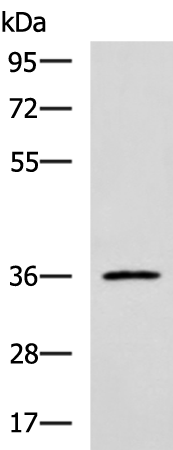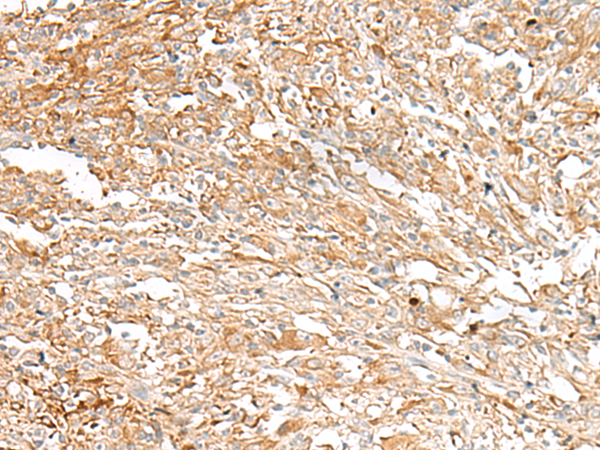

| WB | 1/500-1/1000 | Human,Mouse,Rat |
| IF | 1/20 | Human,Mouse,Rat |
| IHC | 咨询技术 | Human,Mouse,Rat |
| ICC | 技术咨询 | Human,Mouse,Rat |
| FCM | 咨询技术 | Human,Mouse,Rat |
| Elisa | 咨询技术 | Human,Mouse,Rat |
| Aliases | BSP; BNSP; SP-II; BSP-II |
| WB Predicted band size | 35 kDa |
| Host/Isotype | Rabbit IgG |
| Antibody Type | Primary antibody |
| Storage | Store at 4°C short term. Aliquot and store at -20°C long term. Avoid freeze/thaw cycles. |
| Species Reactivity | Human, Mouse |
| Immunogen | Synthetic peptide of human IBSP |
| Formulation | Purified antibody in PBS with 0.05% sodium azide and 50% glycerol. |
+ +
以下是关于PCSK9抗体的3篇代表性文献信息及摘要概括:
---
1. **文献名称**:*Efficacy and Safety of Alirocumab in High-Risk Patients with Hypercholesterolemia: The ODYSSEY LONG TERM Trial*
**作者**:Robinson, J.G., Farnier, M., Krempf, M. et al.
**摘要**:该研究评估了PCSK9抗体Alirocumab在心血管高风险患者中的长期疗效与安全性。结果显示,与安慰剂相比,Alirocumab显著降低LDL-C水平达62%,并减少心血管事件风险,且耐受性良好(发表于《NEJM》, 2015)。
---
2. **文献名称**:*Evolocumab and Clinical Outcomes in Patients with Cardiovascular Disease*
**作者**:Sabatine, M.S., Giugliano, R.P., Keech, A.C. et al.
**摘要**:FOURIER试验研究了PCSK9抗体Evolocumab对动脉粥样硬化性心血管疾病患者预后的影响。结果表明,Evolocumab显著降低LDL-C并减少复合心血管终点事件(心肌梗死、卒中、心血管死亡),但未显著降低全因死亡率(发表于《NEJM》, 2017)。
---
3. **文献名称**:*PCSK9: A Key Modulator of Cardiovascular Health*
**作者**:Seidah, N.G., Benjannet, S., Wickham, L. et al.
**摘要**:综述了PCSK9蛋白的生物学功能及其在LDL代谢中的作用,重点讨论了PCSK9抗体(如Alirocumab和Evolocumab)通过阻断PCSK9-LDLR相互作用降低胆固醇的机制和临床应用前景(发表于《Circulation Research》, 2014)。
---
4. **文献名称**:*Safety and Tolerability of PCSK9 Inhibitors: Current Insights*
**作者**:Koren, M.J., Sabatine, M.S., Giugliano, R.P.
**摘要**:分析多项临床试验数据,总结PCSK9抗体的安全性和耐受性。结果显示,主要不良反应为注射部位反应,但严重不良事件发生率与安慰剂组相似,支持其长期使用的安全性(发表于《Journal of Clinical Lipidology》, 2016)。
---
以上文献涵盖临床试验、机制研究及安全性分析,可帮助快速了解PCSK9抗体的核心进展。
PCSK9 (proprotein convertase subtilisin/kexin type 9) is a liver-derived protein that regulates cholesterol metabolism by binding to low-density lipoprotein receptors (LDLRs), promoting their degradation and reducing the liver’s ability to clear LDL cholesterol (LDL-C) from the blood. Elevated LDL-C is a major risk factor for cardiovascular diseases. The discovery of PCSK9’s role in cholesterol homeostasis in the early 2000s spurred interest in therapeutic inhibition.
PCSK9 monoclonal antibodies, such as alirocumab and evolocumab, were developed to block PCSK9 from interacting with LDLRs. By binding to circulating PCSK9. these antibodies prevent LDLR degradation, enabling more receptors to recycle to the liver surface and enhance LDL-C clearance. Clinical trials demonstrated their efficacy in reducing LDL-C by up to 60%, even in patients resistant to statins. Approved in 2015. they became breakthrough therapies for familial hypercholesterolemia and high-risk cardiovascular patients.
These injectable biologics offer a targeted approach with fewer drug interactions than oral therapies. However, challenges include high costs and the need for regular injections. Ongoing research explores long-acting formulations, oral alternatives, and gene-editing strategies targeting PCSK9. Their success underscores the potential of biologics in managing lipid disorders and preventing atherosclerosis-related complications.
×